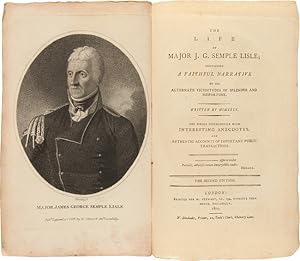THE LIFE OF MAJOR J.G. SEMPLE LISLE; CONTAINING A FAITHFUL NARRATIVE OF HIS ALTERNATE VICISSITUDES OF SPLENDOR AND MISFORTUNE.
Semple Lisle, James George
Librería:
William Reese Company - Americana, New Haven, CT, Estados Unidos de America
Calificación del vendedor: 4 de 5 estrellas
![]()
Vendedor de AbeBooks desde 13 de julio de 2006
Descripción
Descripción:
xxii,[2],382pp. Mezzotint frontispiece portrait. Half title. Original paper-covered boards, printed label. Boards lightly rubbed and soiled, spine and joints cracked and worn, label largely worn away. Occasional light foxing. Three bookplates (two armorial) affixed to front endpapers. Overall a very good copy, untrimmed. Second edition, after the first of 1799. The scarce memoirs of a great scoundrel and adventurer, "including a full account of the mutiny on the Lady Shore, in which he was being carried as a convict to New South Wales, and of the adventures of the landing party in their journey to Rio de Janeiro" (Ferguson). James George Semple, who laid claim to the extinct French title of Viscount Lisle, was born in 1759 in Ayrshire, Scotland, the son of a former excise man. In 1775 he left to serve in America, where he was captured in 1776 and soon released. Upon his return to Great Britain in 1777, Semple befriended novelist Eliza Gooch, who chronicled their meeting in her memoirs, "though," he writes, "not quite correctly" (p.3). In 1778, Semple departed for the Continent with the "notorious" Duchess of Kingston, whose goddaughter he had just married, and proceeded, he claims, to have accompanied Frederick the Great on his 1778 campaign, met with Catherine the Great, traveled with Prince Potemkin to the Crimea, and designed a uniform for the Russian Army. After additional travels in Denmark and Prussia, Semple returned to England and was arrested and sentenced to seven years' transportation for "obtaining goods by false pretenses" (DNB). His sentence was commuted with the provision that he leave England, and he soon found himself in Paris, serving on General Berruyer's staff and witnessing the execution of Louis XVI. Returning to England in 1795, Semple was arrested for defrauding tradesmen, imprisoned at Newgate, and transported to Australia on board the Lady Jane Shore, whose crew mutinied during the voyage. Semple and several others were permitted to leave the ship in a boat and made their way to South America, where further adventures ensued. In 1799, Semple arrived in Tangier, surrendered himself, and was sent back to England, where he was committed to Tothill Fields prison. The present narrative, published during Semple's imprisonment at Tothill Fields, appears to be the last the word heard of Semple, of whom "nothing further is known" by the DNB. FERGUSON 317. SABIN 41421. DNB XVII, p.1179. N° de ref. del artículo WRCAM38591
Detalles bibliográficos
Título: THE LIFE OF MAJOR J.G. SEMPLE LISLE; ...
Editorial: Printed for W. Stewart, London
Año de publicación: 1800
Los mejores resultados en AbeBooks
THE LIFE OF MAJOR J.G. SEMPLE LISLE; CONTAINING A FAITHFUL NARRATIVE OF HIS ALTERNATE VICISSITUDES OF SPLENDOR AND MISFORTUNE.
Librería: William Reese Company - Americana, New Haven, CT, Estados Unidos de America
Second edition, after the first of 1799. The scarce memoirs of a great scoundrel and adventurer, "including a full account of the mutiny on the Lady Shore, in which he was being carried as a convict to New South Wales, and of the adventures of the landing party in their journey to Rio de Janeiro" (Ferguson). James George Semple, who laid claim to the extinct French title of Viscount Lisle, was born in 1759 in Ayrshire, Scotland, the son of a former excise man. In 1775 he left to serve in America, where he was captured in 1776 and soon released. Upon his return to Great Britain in 1777, Semple befriended novelist Eliza Gooch, who chronicled their meeting in her memoirs, "though," he writes, "not quite correctly" (p.3). In 1778, Semple departed for the Continent with the "notorious" Duchess of Kingston, whose goddaughter he had just married, and proceeded, he claims, to have accompanied Frederick the Great on his 1778 campaign, met with Catherine the Great, traveled with Prince Potemkin to the Crimea, and designed a uniform for the Russian Army. After additional travels in Denmark and Prussia, Semple returned to England and was arrested and sentenced to seven years' transportation for "obtaining goods by false pretenses" (DNB). His sentence was commuted with the provision that he leave England, and he soon found himself in Paris, serving on General Berruyer's staff and witnessing the execution of Louis XVI. Returning to England in 1795, Semple was arrested for defrauding tradesmen, imprisoned at Newgate, and transported to Australia on board the Lady Jane Shore, whose crew mutinied during the voyage. Semple and several others were permitted to leave the ship in a boat and made their way to South America, where further adventures ensued. In 1799, Semple arrived in Tangier, surrendered himself, and was sent back to England, where he was committed to Tothill Fields prison. The present narrative, published during Semple's imprisonment at Tothill Fields, appears to be the last the word heard of Semple, of whom "nothing further is known" by the DNB. FERGUSON 317. SABIN 41421. DNB XVII, p.1179. xxii,[2],382pp. Mezzotint frontispiece portrait. Half title. Original paper-covered boards, printed label. Boards lightly rubbed and soiled, spine and joints cracked and worn, label largely worn away. Occasional light foxing. Three bookplates (two armorial) affixed to front endpapers. Overall a very good copy, untrimmed. Nº de ref. del artículo: 38591
Cantidad disponible: 1 disponibles


